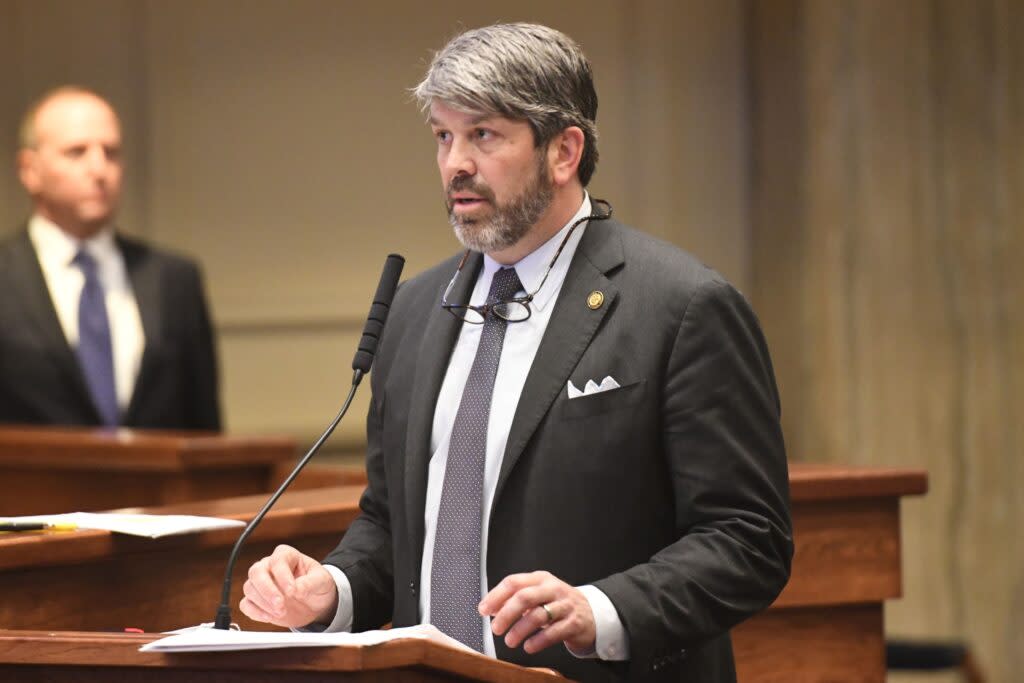Alabama Senate sends anti-DEI, absentee ballot bills to Gov. Kay Ivey

- Oops!Something went wrong.Please try again later.
- Oops!Something went wrong.Please try again later.
- Oops!Something went wrong.Please try again later.
Sen. Garlan Gudger, R-Cullman, speaks on his bill criminalizing certain forms of absentee ballot assistance in the Alabama Senate on March 19, 2024 at the Alabama Statehouse in Montgomery, Alabama. (Brian Lyman/Alabama Reflector)
The Alabama Senate sent two controversial bills to Gov. Kay Ivey’s desk on Tuesday.
The chamber concurred in House changes to SB 1, sponsored by Sen. Garlan Gudger, R-Cullman, that would prohibit any payment for assistance in absentee ballot applications or to “knowingly” provide an absentee ballot with pre-filled information. Gudger said the purpose of the bill was for election integrity.
“We only were dealing with ballot applications in this particular bill,” said Gudger. “That’s all we’re dealing with.”
Gudger said the House changes made it so there could not be any writing on it.
The bill inspired a three-hour filibuster when it first passed the Senate in February. Opponents said the bill would impact people with disabilities in rural areas. But discussion on the concurrence did not last as long.
Sen. Rodger Smitherman, D-Birmingham, asked a series of questions seemingly to test the limits of legislation. such as how it view view buying water in a campaign.
“Are we saying they are still guilty because the person who volunteers and doing it is not getting paid, but the person who’s over volunteers, now they violate the law?” he said.
Gudger said that some of the examples provided by Smitherman were no the intention of the bill.
The bill passed 24-5.
In a statement on Tuesday, SPLC Action Fund Alabama Policy Director Jerome Dees called the bill “one of the most egregious voter restriction bills since the Civil Rights era.”
“This cruel legislation aims to criminalize the charitable acts of Good Samaritans across the state, whether from neighbors, church members, nursing home staffers, or prison chaplains,” he wrote.
SB 129, sponsored by Sen. Will Barfoot, R-Pike Road, limits the use of public funds for DEI efforts and outlines a number of “divisive concepts” that teachers or other public employees cannot compel others to accept or conform. Divisive concepts include “the moral character of an individual is determined by his or her race, color, religion, sex, ethnicity, or national origin” and“meritocracy or traits such as a hard work ethic are racist or sexist.”
The bill passed 25-4.
At the start of the session, the legislation was far more expansive, including that “ slavery and racism are aligned with the founding principles of the United States” was on the list of prohibited divisive concepts.
The House of Representatives amended the bill on the floor.
The bill had originally said that nothing in the bill “may be construed to inhibit or violate the First Amendment rights of any student or employee, or to undermine the duty of a public institution of higher education to protect, to the greatest degree, academic freedom, intellectual diversity, and free expression, provided that none of these protected tenets conflict with this act.” An amendment had struck the final clause.
While the bill had caused an extensive filibuster from the Democratic caucus when it first passed the Senate, a Democratic senator only had the sponsor walk through the bill changes with him Tuesday.
Smitherman spoke with Barfoot to outline each amendment that was added to the bill in the House of Representatives.
The changes included clarifying the definition of “contractor” in the bill. Another change also addressed that legislation could not impact First Amendment free speech.
“I think the point is that we can’t, by two pages or 5,000 pages, infringe on anyone’s first amendment right,” Barfoot said.
The ACLU of Alabama said both bills were a “blow” to civic groups, students and Alabamians.
Speaking after the Senate adjourned, Senate Minority Leader Bobby Singleton, D-Greensboro, said that both bills were unnecessary, but amendments to the legislation had diluted their impact. He said the absentee ballot bill was “a bad bill, an unnecessary bill and not needed.”
“But the fact that it only deals with the application process and the amendments that we were able to put on, I’m okay with it going to the governor and being signed,” he said. “While I still don’t support it, but I think it’s voting suppression at best, but at the end of the day, I think we’ll be okay.”
Singleton said the DEI and divisive concepts could have ongoing consequences, such as for higher education. He also said that many major companies in the state, such as automakers, are based in different countries.
“That scares me, in terms of whether or not we’ll run other companies in the future away from Alabama,” he said.
Updated at 6:41 p.m. with comments from Senate Minority Leader Bobby Singleton, D-Greensboro.
The post Alabama Senate sends anti-DEI, absentee ballot bills to Gov. Kay Ivey appeared first on Alabama Reflector.

